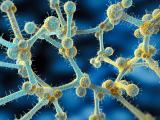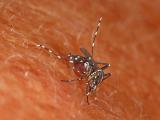Oct 12, 2012
First weekly update of season shows low US flu levels
In its first weekly update of the 2012-13 influenza season today, the Centers for Disease Control and Prevention (CDC) reported low US flu activity, with no pediatric deaths attributed to flu and no new cases of swine-origin variant H3N2 (H3N2v) or other novel influenza types. The agency reported that deaths from pneumonia and flu were below the epidemic threshold, and the proportion of outpatient visits due to flulike illness was 1.2%, which is below the national baseline of 2.2%. It said that, of 2,870 specimens tested during the week that ended Oct 6, 75 (2.6%) were positive for influenza. Southeastern states had the highest rate of positive tests, at 6.3%. Although the number of specimens testing positive for flu was small, they show a fairly even split between influenza A (39, or 52%) and influenza B (36, 48%). Of the influenza A viruses, 27 samples (69%) were seasonal H3N2 (not H3N2v), 3 (8%) were pandemic 2009 H1N1, and 9 (23%) were not subtyped.
Oct 12 CDC FluView update
Fungal meningitis outbreak grows to 185 cases
The number of cases in a multistate fungal meningitis outbreak linked to steroid injections for pain increased by 15 today, to 185, but the death toll was unchanged at 14, the CDC reported today. Texas became the 12th state affected, with one case. The outbreak includes 184 meningitis cases linked to spinal injections and one peripheral joint infection, which CDC officials said yesterday was related to an ankle injection. The infections have been tied to methylprednisolone acetate from the New England Compounding Center in Framingham, Mass.
Oct 12 CDC update
Oct 11 CIDRAP News story on the outbreak
Madeira dengue outbreak tops 200 confirmed, probable cases
Officials have confirmed 18 cases of dengue fever and listed 191 more as probable in Madeira, a Portuguese archipelago in the Atlantic that is a popular tourist destination this time of year, the European Centre for Disease Prevention and Control (ECDC) said yesterday in a risk assessment. It called the outbreak "not entirely unexpected given the established presence of the Aedes aegypti mosquito—the best mosquito vector for the disease—on Madeira." The agency said Portuguese health officials have implemented disease-control measures and are encouraging visitors to practice individual control measures to avoid mosquito bites. The ECDC said the situation does not warrant travel restrictions to Madeira, but neighboring areas like the Canary Islands need to assess the risk of the disease. The UK's Health Protection Agency (HPA) said today that this is the first instance of the disease on the archipelago.
Oct 11 ECDC news release
Oct 11 ECDC risk assessment
Oct 12 HPA statement

















